ISLAMABAD: Pakistan’s Supreme Court on Wednesday rejected former prime minister Imran Khan’s plea that his trial on charges of unlawfully selling state gifts be halted on concerns over the merits of the trial and that the judge hearing it was biased.
Legal experts say a possible conviction in the case could end Khan’s political career.
The Supreme Court asked Khan to go back to the Islamabad High Court to seek a ruling over his objections, according to an order seen by a Reuters reporter who attended the top court’s proceedings.
Khan’s legal team moved to the top court this month after the high court ruled against their plea that the trial couldn’t be maintained on the election commission’s petition, according to Khan’s lawyer Barrister Gohar Khan.
The Supreme Court cannot interfere in the trial court proceedings, said one judge on the two-member panel of the top court, which disposed of Khan’s petition, directing the high court to hear all his petitions related to the trial.
The trial court had indicted Khan in May on the charges and summoned him to commence his formal trial, which is now pending due to the challenge by his legal team in the high court.
The trial court case relates to an inquiry conducted by the Election Commission of Pakistan, which found Khan guilty of unlawfully selling state gifts during his tenure as prime minister from 2019 to 2022.
The 70-year-old cricket hero-turned-politician has been embroiled in a string of court cases since he was ousted in a parliamentary vote of confidence last year after having fallen out with the powerful military, which tends to decide who will rule the 220-million South Asian nation.
The military denies having a role in his ouster.
Top Pakistan court rejects Imran Khan’s plea that trial be halted
https://arab.news/rzbvv
Top Pakistan court rejects Imran Khan’s plea that trial be halted
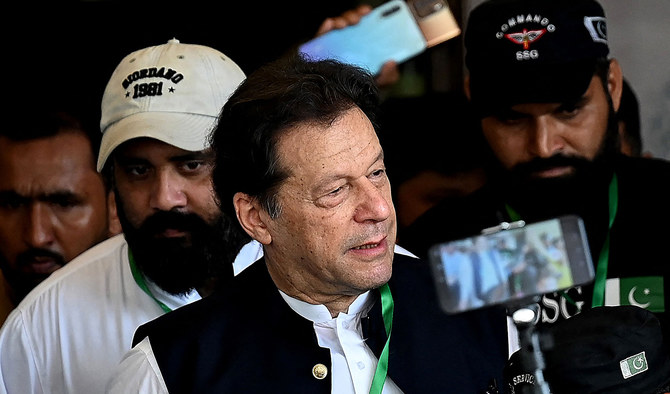
- Experts say a possible conviction in the case involving the sale of state gifts could end Khan’s political career
- Khan has been embroiled in a string of court cases since he was ousted in a parliamentary vote last year
Opposition leaders in Kashmir accuse Indian government of sabotaging their campaigns
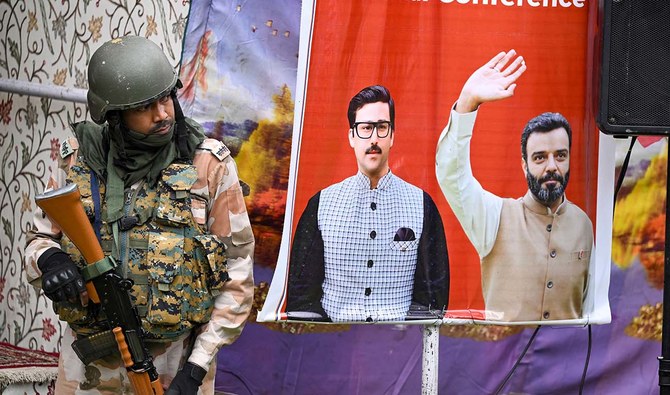
- Omar Abdullah says police canceled permissions for his rallies, asking him to reschedule without giving reasons
- Mehbooba Mufti of People’s Democratic Party also accused the police of not allowing her to hold campaign events
NEW DELHI: Opposition leaders in India’s troubled Kashmir valley have accused Prime Minister Narendra Modi’s administration of denying or canceling permissions to hold campaign events, to help his party’s “proxies.”
Omar Abdullah, a leader of the largest regional political party, the National Conference, said Modi’s government was trying to sabotage his campaign ahead of voting in the first of Kashmir’s three seats on Monday.
Modi’s Bharatiya Janata Party (BJP) is skipping elections in Kashmir for the first since 1996, which analysts and politicians in the region say belies his narrative of integrating Kashmir with the rest of the country and bringing peace and normality to the valley ravaged by a 35-year-old uprising against India’s rule.
In 2019, Modi revoked Jammu and Kashmir state’s partial autonomy, removed its statehood and divided it into two federally-controlled territories: Muslim-majority Kashmir with Hindu-dominated Jammu, and a mountainous Buddhist territory of Ladakh.
While the BJP has not fielded any candidate in Kashmir’s three seats, it has said that, as part of its grand strategy, it would instead support other smaller regional parties, without naming which.
In a letter to the federal poll watchdog, the Election Commission of India, on Thursday, Abdullah said the police, which are under the federal government’s control, canceled permissions for his rallies, asking him to reschedule without providing any reasons.
He said on social media platform X that it was done to help the BJP’s “proxy candidates.”
His rival Mehbooba Mufti, who heads the other regional political powerhouse the People’s Democratic Party (PDP), also accused the police of not allowing her to hold campaign events.
“This attitude of the police, in which they curtail our movement to support the proxy parties of the BJP, is against the guidelines of the Election Commission of India,” she said at a rally in Srinagar on Thursday.
V.K. Birdi, the police official responsible for Kashmir, did not immediately respond to a request seeking comment.
Both Abdullah and Mufti have said they were opposed to the BJP and would support an opposition Congress-led alliance of more than two dozen parties federally.
The state unit of the election watchdog has also asked PDP’s Srinagar candidate, Waheed ur Rehman Para to refrain from calling this election a “referendum” against scrapping of semi-autonomy of the region in 2019 in his speeches.
While Srinagar will vote on May 13, the elections in the other two seats will be held on May 20 and 25.
Nuclear-armed neighbors India and Pakistan control parts of Kashmir, but claim it in full, and have fought two of their three wars over the region.
India top court grants temporary bail to opposition leader Kejriwal to campaign in elections
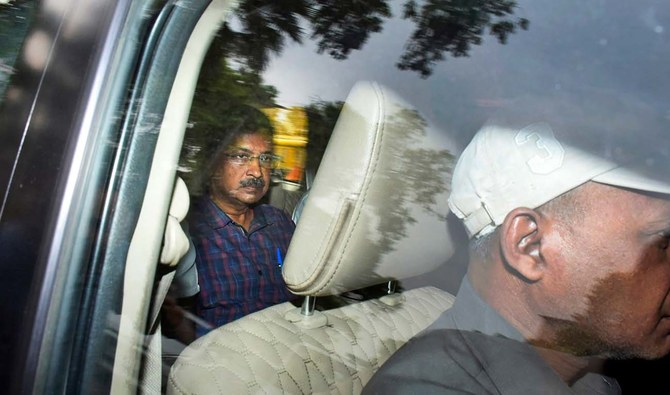
- Bail would last until June 1, last day of seven-phase vote, and Kejriwal would have to surrender on June 2
- Poll marred by charges that PM Narendra Modi’s government is using investigating agencies to hurt rivals
NEW DELHI: India’s top court gave temporary bail to Delhi Chief Minister Arvind Kejriwal in a graft case on Friday, allowing him to campaign in the ongoing general elections, boosting the opposition alliance of which he is a key leader.
The court said the temporary bail would last until June 1, the last day of the seven-phase vote, and Kejriwal would have to surrender on June 2.
The poll has been marred by charges that Prime Minister Narendra Modi’s government is using investigating agencies to hurt rivals, accusations the government denies.
The Enforcement Directorate, India’s financial crime-fighting agency, arrested Kejriwal — a staunch critic of Modi and a key opposition leader — on March 21 in connection with corruption allegations related to the capital territory’s liquor policy.
Kejriwal’s government and his Aam Aadmi Party have denied the corruption allegations. Modi and his Bharatiya Janata Party say that the investigating agencies are only doing their job and the government is not influencing them.
Kejriwal has been in pre-trial detention since April 1, and his wife Sunita has stepped in to campaign for his decade-old party in his absence.
India began voting on April 19 and elections to more than half the total 543 seats were completed with the third phase on May 7. The national capital territory will vote on May 25.
Voting concludes on June 1 and counting is set for June 4.
The Supreme Court, while hearing an appeal against Kejriwal’s arrest last week, said that it “may” consider granting “interim bail” or temporary bail to the high-profile leader “because of the elections” as the appeal against his arrest could take a while to conclude.
Kejriwal argued that he was arrested just before the vote to stop him from campaigning against Modi, who opinion polls suggest will win a comfortable majority and secure a rare third straight term.
His lawyer said Kejriwal is a serving chief minister, not a “habitual offender.”
ED lawyers argued that giving bail to a politician just to campaign will send a wrong message that there are different standards for them and other citizens. Kejriwal had to be arrested as he refused nine ED summons over six months to appear for questioning, they added.
The INDIA alliance of more than two dozen opposition parties has called the action against Kejriwal and other opposition leaders politically motivated to deny them a level playing field in the polls, accusations Modi and BJP reject.
Kejriwal’s arrest had drawn international attention, with Germany and the United States calling for a “fair” and “impartial” trial.
Pakistani satellite relays first images of moon from lunar orbit
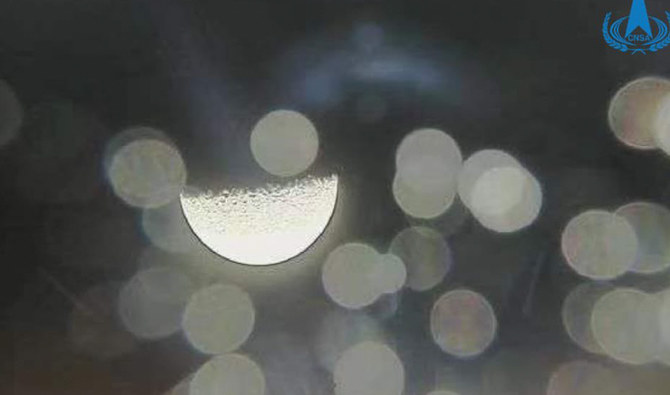
- ICUBE-Qamar was launched aboard China’s Chang’e-6 probe on May 3
- The Chinese probe is tasked with landing on the far side of the moon
ISLAMABAD: Pakistan’s first satellite, ICUBE-Qamar (ICUBE-Q), has successfully beamed back first images of the moon, the Institute of Space Technology (IST) in Islamabad said on Friday, days after it entered the lunar orbit.
The ICUBE-Qamar satellite carries two optical cameras to image the lunar surface and weighs around 7kg. Cubesats are tiny box-shaped satellites that are mainly launched into low Earth orbit to observe the Earth, test new communications technology, or perform miniature experiments.
The satellite was launched aboard China’s Chang’e-6 probe on May 3. The Chinese probe is tasked with landing on the far side of the moon, which perpetually faces away from the Earth, after which it will retrieve and return samples. China is the first country to make such an ambitious attempt.
“Exciting news from ICUBE-Q! Our satellite has captured its first images, and they’re stunning,” IST, which contributed to the satellite’s development, wrote on X.
“Check out these shots where you can see both the moon and the sun in some of the images. Stay tuned for more updates from ICUBE-Q!“
Soon after the satellite entered the lunar orbit at 1:14pm Pakistan time on Wednesday, Dr. Khurram Khurshid, the head of the electrical engineering and computer science department at the IST and a co-lead on the project, said initial tests revealed there were no complications with the cubesat’s system.
The development meant Pakistan was officially in an exclusive club of countries that had conducted deep space missions, the official added.
Around 100 students from the IST contributed to developing the satellite. Pakistan’s proposal to build the satellite was accepted by the China National Space Agency (CNSA) from plans submitted by eight member states of the Asia-Pacific Space Cooperation Organization (APSCO).
The design, development, and qualification of the ICUBE-Q satellite were spearheaded by faculty members and students of the IST in collaboration with China’s Shanghai Jiao Tong University (SJTU), with support from Pakistan’s National Space Agency, SUPARCO.
Pakistan, Gulf states in final stages of talks on Free Trade Agreement — PM Sharif
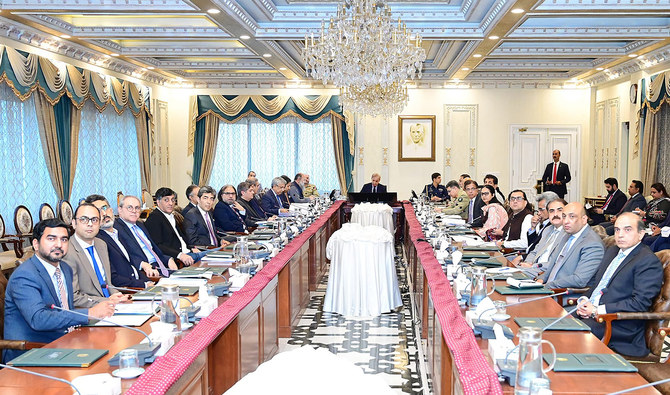
- Pakistan and the Gulf Cooperation Council signed a ‘preliminary’ FTA in September last year
- The development comes amid Pakistan efforts to boost trade to stabilize dwindling economy
ISLAMABAD: Pakistan and the Gulf states are in final stages of discussions regarding a Free Trade Agreement (FTA) between the two sides, Pakistani state media reported on Friday.
Pakistan and the Gulf Cooperation Council (GCC) signed a “preliminary” FTA in September last year, with the country’s commerce ministry calling it a “milestone in both sides’ economic cooperation.” The GCC also said the agreement represented “an important turning point in cooperation.”
In 2022, both sides held technical-level talks to examine the possibility of an FTA that could help Pakistan boost exports to the six-nation bloc, which includes Saudi Arabia, the United Arab Emirates, Bahrain, Oman, Qatar, and Kuwait.
Presiding over a meeting on the trade sector, Prime Minister Shehbaz Sharif asked the authorities to formulate trade policies with the core objective of facilitating the country’s business sector, the state-run APP news agency reported.
“In the meeting, the prime minister was told that the discussion on the Free Trade Agreement between Pakistan and the Gulf states was in the final stage and transit trade agreements with Uzbekistan and Tajikistan had already been materialized,” the report read.
During a recent Pakistan-Saudi Business Conference, according to the report, around 450 business-to-business meetings were held and the volume of e-commerce trade was witnessing a constant increase, with the enlisting of over 3,000 firms on the Pakistan Trade Portal.
Pakistan has welcomed numerous foreign officials and business delegations in recent weeks, encouraging local partnerships and asking them to explore investment opportunities across various economic sectors.
A Saudi business delegation, consisting of senior representatives from nearly 35 companies, recently concluded its visit to Pakistan, during which the delegates held several business-to-business meetings. Additionally, Prime Minister Shehbaz Sharif met with a group of Japanese industrialists, urging them to invest in Pakistan’s nascent electric car industry.
The country is also expecting the visit of Saudi Crown Prince Mohammed bin Salman later this month, hoping it would bring several billion dollars in investment.
During the meeting on the trade sector, the prime minister called for steps to promote exports of non-traditional goods and instructed authorities for immediate payment of certified duty drawbacks to exporters, according to the APP report.
He instructed officials to ensure consultation with them during the policy-making and implement the deletion policy to uplift the auto sector.
“Prime Minister Shehbaz directed the relevant ministry to devise a comprehensive strategy to scrutinize the performance of trade and investment officers posted in Pakistan’s missions abroad by rewarding the good performers and removing the incompetent ones,” the report read further.
The development comes as Pakistan seeks a fresh bailout from the International Monetary Fund (IMF) to stabilize its dwindling economy after completing its $3 billion IMF bailout deal that helped avert a default last year.
The South Asian country currently has Free Trade Agreements with China, Malaysia, and Sri Lanka, but it still needs to increase exports to other trade destinations.
Historic cuts in Pakistan car prices a ‘marketing stunt’ amid slow demand — experts
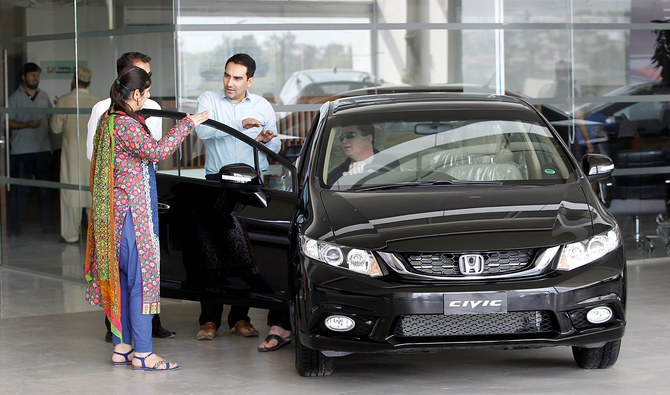
- Lucky Motor Company, which assembles KIA cars in Pakistan, and Pak Suzuki Motors recently reduced Stonic, Swift prices by up to Rs1.5 million
- Experts say the automakers wanted to “test” the market through the stunt and the benefit would not end customers as it was opened for few days
KARACHI: The recent historic cuts in prices of multiple car models were a “marketing stunt” by automakers in Pakistan, experts and dealers said on Friday, attributing it to slow demand in the South Asian country.
Lucky Motor Company, which assembles KIA cars in Pakistan, reduced the price of KIA Stonic by as much as Rs1,500,000, followed by a cut in Swift price by up to Rs710,000.
The rate cuts by Kia and Pak Suzuki Motors came on the heels of a reduction in prices of Toyota Yaris by Rs133,000 and Honda City by Rs140,000 respectively in March.
While KIA and Pak Suzuki Motors have said they received an “overwhelming” to the price drops, experts believe it to be a marketing stunt to help struggling models fare better in the Pakistani market.
“They (LMC) played a game because they had about 300-350 (KIA Stonic) cars lying dead which were not sold,” Hajji Muhammad Shahzad, chairman of All Pakistan Motor Dealers Association (APMDA), told Arab News.
“They threw [them] in the market and stopped the booking.”
Shahzad said the price cut by the LMC generated interest among investors who booked the car instead of “genuine buyers,” noting that the car would come with around Rs500,000 own money as well.
Mashood Ali Khan, an auto industry expert, believed that price plays a key role in the auto sector, because of the current economic situation and prevailing high inflation. He said the LMC wanted to “test” the market.
“The people who have booked, maybe I am wrong, but I think they are mostly the investors,” Khan told Arab News. “It could not reach the end consumers as it was opened for two days.”
Reached for comment, LMC Chief Executive Officer Muhammad Faisal said they corrected the KIA Stonic price to help it compete with sedan cars available in Pakistan and “took the hit” themselves, though the automaker didn’t anticipate the overwhelming response to the price cut.
“We tried to bring it to the price point at which competing sedans are available,” Faisal told Arab News. “When we brought it to this price point, the response from the market was unbelievable and better than our expectations.”
Though a Pak Suzuki Motor official did not respond to Arab News query about the cut in Swift price, the company said in a circular it had received an “overwhelming” response and was now introducing “stylish combinations” of a two-tone exterior.
Shahzad, however, said Swift did not get a “good response” despite the price cut.
A decrease in car prices was already expected as the Pakistani government notified in March it would charge 25 percent sales tax on locally assembled cars, if their invoice price exceeded Rs4 million.
Car sales declined in Pakistan by 38 percent during nine months of the current fiscal year, which began on July 1, amid a declining trend in auto financing, historic high interest rate, soaring prices and shrinking purchasing power of consumers, according to a research report by the Karachi-based Darson Securities.
Asked about the delivery of vehicles to customers, LMC CEO Faisal said the company had not delivered the newly booked Stonic cars and was still filtering buyers.
“We have just made a commitment that we will deliver it now,” he told Arab News. “We have ensured that we will book one car per CNIC (computerized national identity card), we are filtering the investors, we are giving preference to genuine customers, so that we can deliver it soon.”
Faisal said the automaker was evaluating its stock position after the current response and it would resume bookings, however, the company would be giving delivery commitments for October onwards.
Car prices have increased in Pakistan by around 40 percent in the last two years and the costs of vehicles remain high despite the recent cuts, according to car dealers.
Khan, the auto sector expert, called for localization of auto parts and a 10-year policy to promote auto industrialization to make affordable cars in Pakistan.










